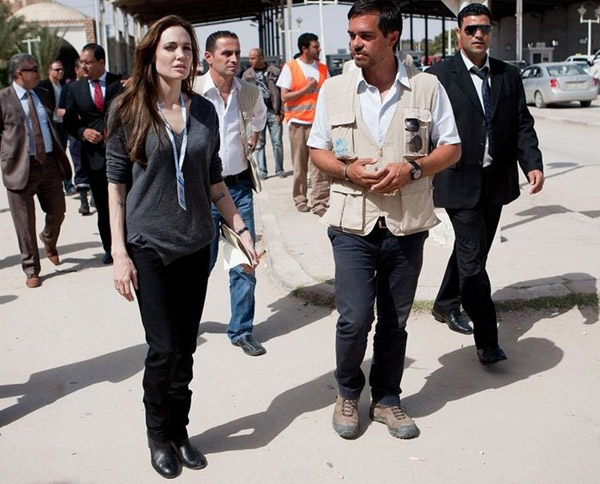Angelina Jolie travels to Tunisian-Libyan border
 0 Comment(s)
0 Comment(s) Print
Print E-mail
China.org.cn, April 6, 2011
E-mail
China.org.cn, April 6, 2011
Hollywood actress and United Nations Goodwill Ambassador Angelina Jolie Tuesday travelled to the Tunisian-Libyan border, where she spoke with people who had recently fled the fighting in Libya and highlighted the need for greater international support for those affected by the crisis.
Jolie, who advocates on behalf of the UN High Commissioner for Refugees (UNHCR), commended the outpouring of generosity from the Tunisian people, saying it is a sign of the openness sweeping across the region.
Tunisia has received more than half of the outflow from Libya, according to UNHCR, which reports that at least 400,000 people have escaped the violence in the last month alone. The neighboring countries of Egypt, Niger, Algeria, Chad and Sudan have also taken in people fleeing the fighting that has erupted between pro- and anti-Government supporters.
"The international community has done well to reinforce Tunisia's remarkable relief effort," said Jolie. "But with 2,000 people still crossing each day, we cannot let the funding dry up and need to sustain the momentum."
The UN Office for the Coordination of Humanitarian Affairs (OCHA) reported Tuesday that the flash appeal for Libya has been updated from $160 million to $310.8 million. The first appeal had received $113 million, or 70 percent, in funding. OCHA said it is estimated that over 1.5 million people may be affected by the conflict and require some form of humanitarian assistance.
During Jolie's visit, the Jolie-Pitt Foundation has covered the costs for a flight of 177 persons to return to their countries of origin and bought an ambulance to help support Tunisian efforts on the border to assist the injured arriving from Libya.
"We would encourage others, individuals and governments, to continue to support and assist with the needs on the ground," said Jolie.
She also highlighted the plight of some 2,500 people from war-torn countries who are among those who left Libya and are unable to return home and thus require international protection.
In addition, she called for a humanitarian corridor inside Libya, both to deliver vital assistance to those inside such as food and medicine, as well as to facilitate safe access for those seeking refuge in safer areas.
Monday, the UN envoy for Libya said the international community must continue to work together to help the people of the North African nation find a solution to their conflict, adding it remained unclear how long the current situation would last. The unrest in Libya follows weeks of protests against the regime of Muammar al-Qaddafi.
Reporting to the Security Council after his recent mission to the country, Abdel Elah al-Khatib said that despite the effectiveness of the efforts by coalition members to implement a no-fly zone and protect civilians, the fighting has continued between ground forces of the armed opposition and Colonel Qaddafi's loyalists.
Information on the humanitarian situation in Libya remained limited due to a lack of access, he stated, while adding that it is feared there are significant civilian protection concerns such as landmines, gender-based violence and human rights violations.
"Overall humanitarian conditions, especially in and around areas of where fighting is taking place remain grave, particularly regarding medical and protection needs," said al-Khatib.






